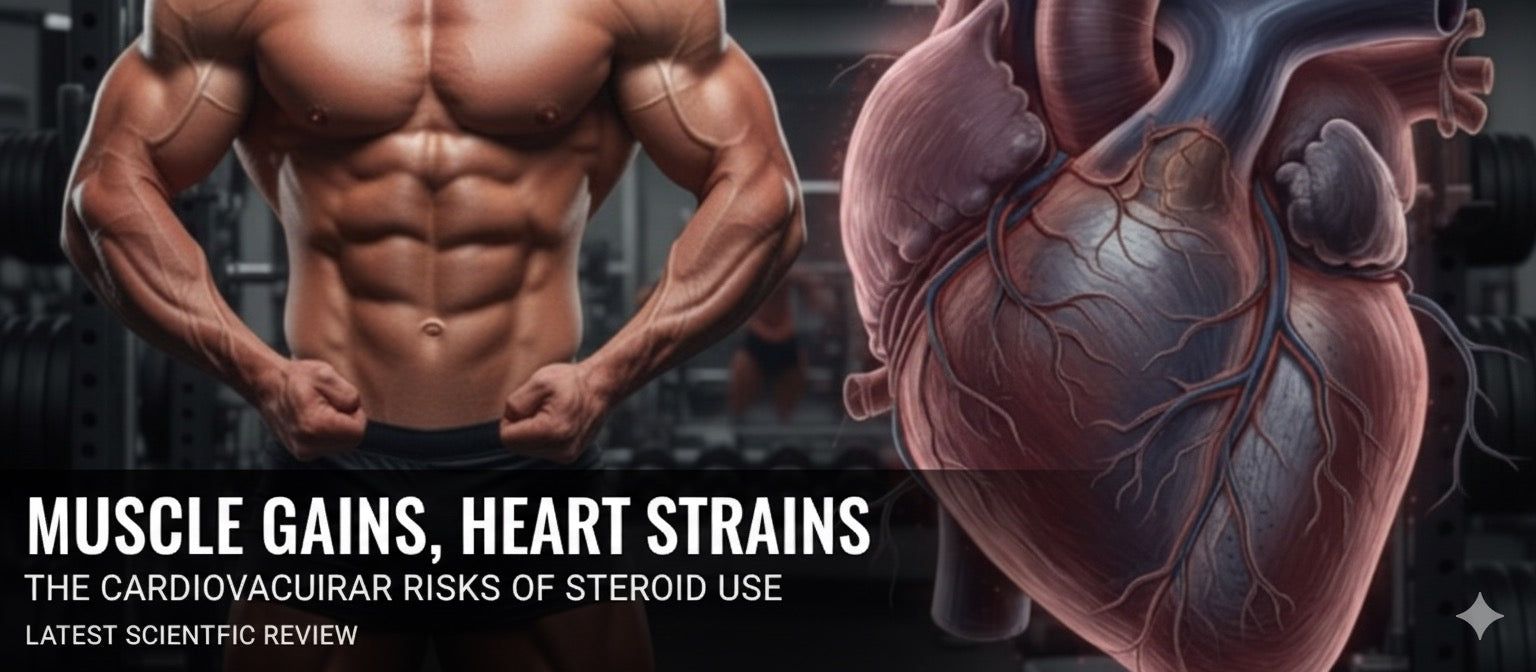


Muscle Gains, Heart Strains- The Cardiovascular Risks Of Steroid Use
LATEST SCIENTIFIC REVIEW
Abstract
Anabolic–androgenic steroids (AAS) are synthetic drugs that act like testosterone and are often misused by athletes and bodybuilders to quickly gain muscle and strength. While they may provide short-term physical benefits, they come with serious risks—especially for the heart. Research shows that long-term or high-dose steroid use can raise blood pressure, worsen cholesterol levels, stiffen and scar the heart muscle, trigger dangerous heart rhythms, and lead to heart failure. Steroids also raise the risk of blood clots, strokes, and kidney damage.
Stopping steroids is the most important step, and some people may recover heart function afterward. However, others may experience permanent damage, depending on how long and how much they used. Doctors rely on blood tests, heart imaging, and scans to identify steroid-related heart problems. Treatment typically involves heart medications, lifestyle changes, and in severe cases, advanced interventions.
The bottom line: steroids may build muscles, but they can also break the heart. Awareness, prevention, and early medical care are key to reducing long-term harm.
Introduction
Anabolic–androgenic steroids (AAS) are man-made versions of testosterone, the main male sex hormone. Doctors sometimes prescribe them for conditions like low testosterone, anemia, or severe weight loss. But since the 1950s, steroids have been misused by athletes and gym-goers looking to build muscle and strength quickly.
While steroids can boost muscle mass, they also come with serious downsides. Beyond mood swings, liver problems, and hormonal imbalances, one of the biggest dangers is damage to the heart and blood vessels. This article takes a closer look at how steroids affect the heart, what the science shows, and why early awareness and prevention are so important.
How Steroids Harm the Heart
Steroids can cause many changes inside the body that increase cardiovascular risk. When people take far more than medical doses, the body’s balance is disrupted. Over time, this can lead to:
- High blood pressure and cholesterol problems that strain the heart.
- Thickening and stiffening of heart muscle (hypertrophy), which makes it harder for the heart to pump.
- Scarring and fibrosis, which reduce flexibility and function.
- Irregular heart rhythms that can trigger sudden cardiac events.
- Increased blood clot risk, which can lead to stroke or heart attack.
- Kidney damage, which indirectly worsens cardiovascular health.
Some people recover when they stop steroids, especially if the use was short-term. But heavy or long-term use can leave lasting, even permanent, heart damage.
Key Risks in Detail
Atherosclerosis (Artery Damage): Prolonged use of anabolic steroids can lead to speeding up plaque buildup in arteries. This can cause blockages that raise the risk of heart attack and stroke.
High Blood Pressure: Many studies show steroid users develop higher blood pressure, sometimes reaching dangerous levels. The risk increases the longer steroids are used.
Cell Damage and Scarring: Steroids increase oxidative stress and trigger apoptosis (cell death). In the heart, this weakens muscle fibers, leading to scarring and impaired pumping ability.
Vasospasm (Sudden Artery Constriction): At high doses, steroids cause blood vessels to tighten instead of relax, cutting off oxygen to the heart and increasing the chance of a heart attack.
Clotting Problems: Steroids thicken the blood and encourage clot formation. This raises the risk of deep vein thrombosis, pulmonary embolism, and arterial blockages.
Heart Enlargement: Long-term steroid use often leads to enlarged heart muscle. While it may look strong, it actually makes the heart stiffer, weaker, and more prone to failure.
Kidney Injury: Steroids strain the kidneys, especially when combined with high-protein diets. This can lead to long-term kidney disease, which makes heart problems worse.
How Doctors Diagnose Steroid-Related Heart Damage
Doctors use several tools to identify heart damage linked to steroids:
- Patient history (asking openly about steroid use).
- Blood tests for heart damage markers.
- Echocardiograms (ultrasound) to check heart size, pumping strength, and stiffness.
- Electrocardiograms (ECG) to spot irregular heart rhythms.
- Cardiac CT and MRI for detailed imaging, including scarring and fibrosis.
These tests reveal patterns like reduced pumping strength, enlarged ventricles, abnormal relaxation, and sometimes visible scarring.
Treatment and Recovery
The first and most important step is stopping steroid use completely. In some cases, heart function improves or even returns to normal after quitting. But for others, especially long-term users, the damage is irreversible.
Treatment usually includes:
- Standard heart failure medications (beta-blockers, ACE inhibitors, ARBs, ARNI drugs, MRAs, SGLT2 inhibitors).
- Blood pressure and cholesterol management.
- Lifestyle changes: exercise, healthy diet, quitting smoking.
- Advanced treatments: in severe cases, implantable defibrillators, mechanical heart support, or even heart transplant may be needed.
- Counseling and support for steroid dependence.
Can the Heart Heal After Steroid Use?
Research shows mixed outcomes. Some people see their heart return to near-normal after quitting, especially if they didn’t use steroids for very long. Others continue to struggle with enlarged hearts, stiffened arteries, or chronic heart failure even years later. The earlier steroids are stopped, the better the chance of recovery.
The Bottom Line
Steroids may deliver fast muscle gains, but the trade-off can be devastating for your heart. Users face risks of high blood pressure, artery disease, heart failure, and even sudden death.
The good news is that stopping early, getting medical care, and raising awareness can make a real difference. For athletes, bodybuilders, and fitness enthusiasts, understanding these dangers is key to making informed choices.
Muscle gains aren’t worth a broken heart.
REFERENCE:
Anabolic-Androgenic Steroids Induced Cardiomyopathy: A Narrative Review of the Literature
Panagiotis lliakis et al.
Biomedicines. September 7, 2025




